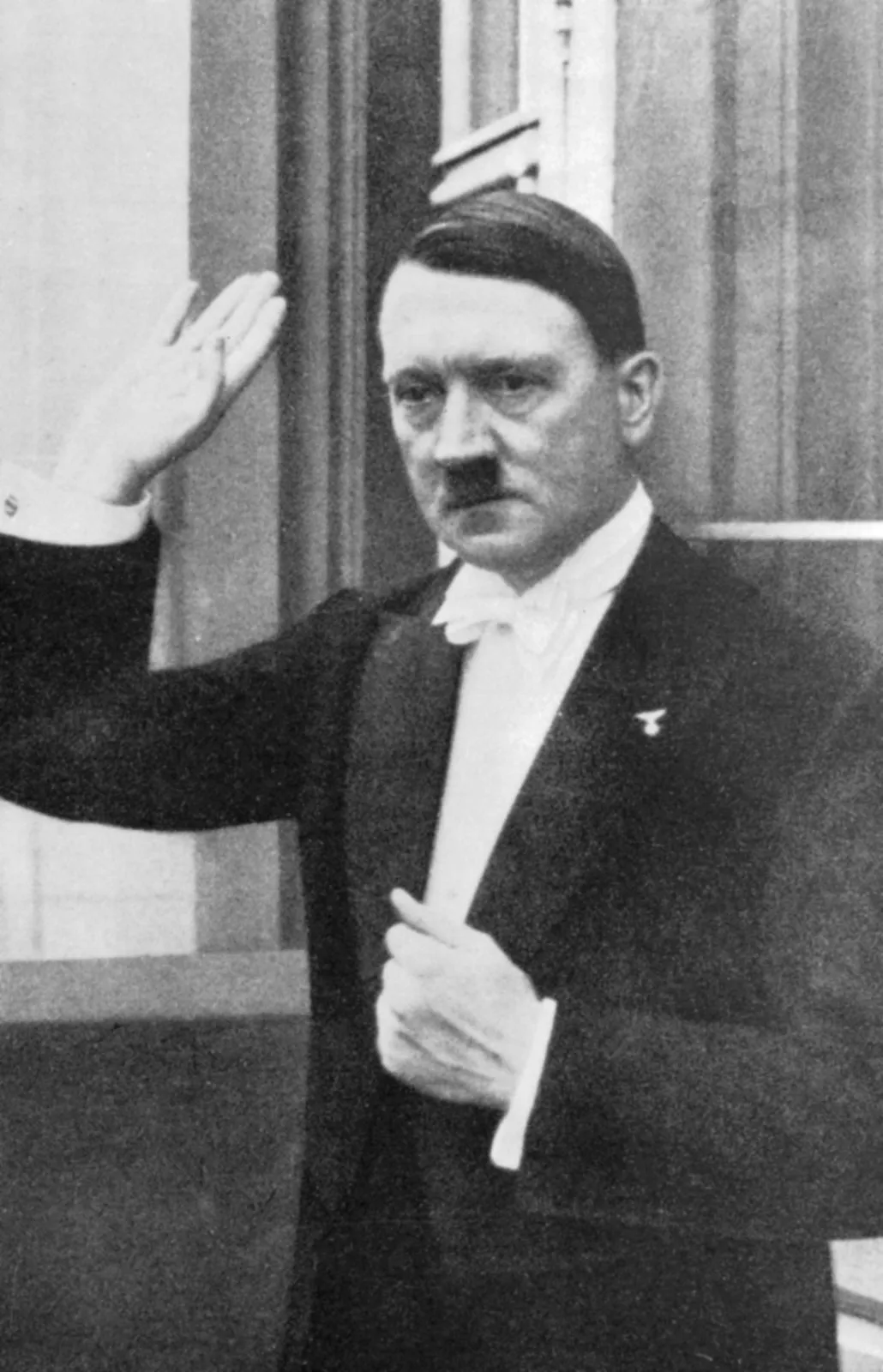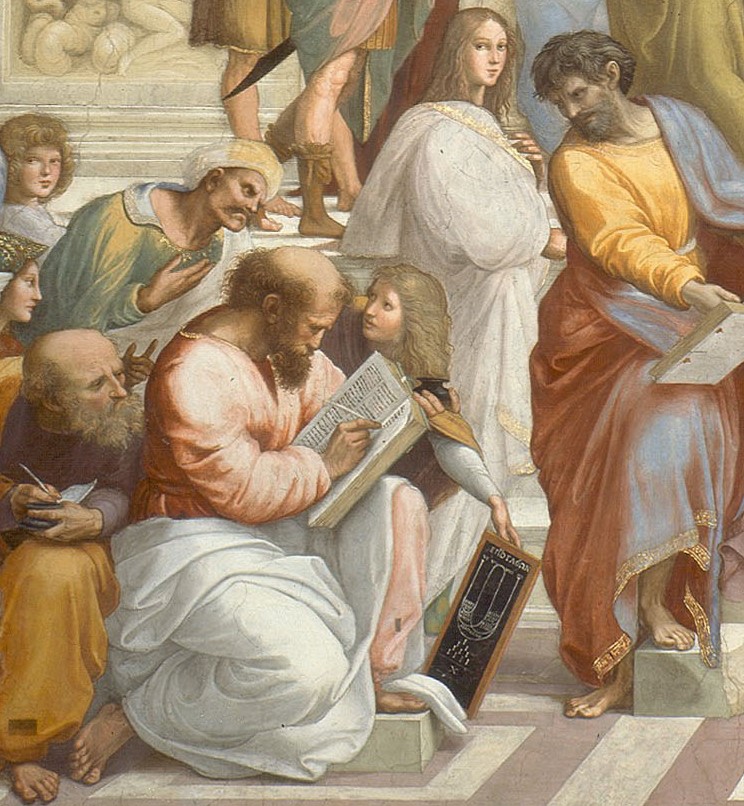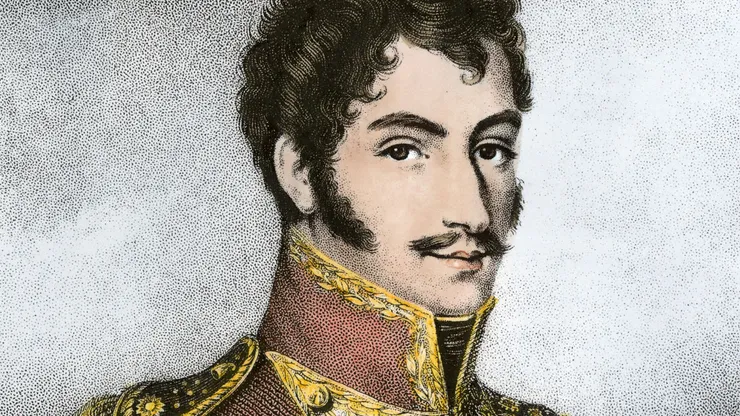Adolf Hitler: (1889/04/20 – 1945/04/30) : Austrian-born German dictator
– I am a nationalist, but I am not a patriot –
- One of the most ruthless leaders in history.
- Positions : Führer of Nazi Germany from 1934 to 1945
- Party : DAP and NSDAP
- Book : My Struggle
- Parents : Alois Hitler and Klara Polzl
- Spouse : Eva Braun
- Partner : Maria Reiter
- Height : 1.72 m
- Name : Original pronunciation
Summary
German politician and leader of the Nazi Party. He rose to power as Chancellor of Germany in 1933 and then as Führer in 1934. During his dictatorship from 1933 to 1945, he started World War II in Europe by invading Poland in September 1939. He was heavily involved in military operations during the war and was essential to the perpetration of the Holocaust.
Adolf Hitler Questions and Answers
- When was he born : April 20, 1889
- Place of birth : Braunau am Inn (Austria)
- What was his father’s name : Alois Hitler (1837-1903)
- What was her mother’s name : Klara Pölzl (1860-1907)
- How many siblings did he have : Of the five children of Alois and Klara, only Adolf and his sister Paula reached adulthood. His father also had a son, Alois Jr., and a daughter, Angela, with his second wife.
- What studies did Hitler have : He was a mediocre student who did not finish high school
- What military rank did he achieve : In World War I he enlisted as a volunteer in the Bavarian Army and the highest rank he achieved was corporal
- What was your political party : DAP and NSDAP
- Why he was imprisoned : In November 1923, he led an unsuccessful rebellion against the Weimar Republic, in which he declared himself chancellor.
- What work did he write : Sentenced to five years in prison, he dedicated the eight months of his sentence to write Mein Kampf (My fight)
- What was Hitler : Führer August 2, 1934 – April 30, 1945 (highest authority of National Socialist Germany)
- When did he die : April 30, 1945 (age 56)
- Cause of death : Suicide by firearm
- What was Hitler’s partner called : Maria Reiter (1926)
- Who was your spouse : Eva Braun
- When married : April 29, 1945
- How many children did he have : 0
- How tall was : 1.75 m
- What was your zodiac sign : Taurus
“When a war is started and unleashed, what matters is not being right, but achieving victory”
Adolf Hitler
Adolf Hitler was born on April 20, 1889, in Braunau am Inn, Austria.
Family
He was the fourth of six children born to Alois Hitler, an alcoholic customs officer, and his third wife, the peasant Klara Hitler, to whom his son had a lifelong devotion. Three of his siblings, Gustav, Ida and Otto, died in infancy. When he was three years old, the family moved to Passau, Germany.
Studies
Adolf Hitler was a mediocre student who did not finish high school. He applied to the Academy of Fine Arts in Vienna, but was not admitted due to lack of talent. He remained in that city until 1913, where he lived thanks to an orphan’s pension and some income from the pictures he painted.
First World War
In World War I he enlisted as a volunteer in the Bavarian Army. Hitler proved to be a dedicated and brave soldier, although the highest rank he achieved was that of corporal, because his superiors considered him to lack leadership skills.
After Germany’s defeat in 1918, he returned to Munich and remained in the Army until 1920. He was appointed a training officer and given the task of immunizing the soldiers in his charge against pacifist and democratic ideas.
Nazism
Hitler joined the nationalist German Workers’ Party in September 1919, and by April 1920 he was devoting all his time to it. By this time, it had been renamed the National Socialist German Labor Party (known for short as the Nazi party ) and Hitler was elected in 1921 its president ( Führer ) with dictatorial powers.
He spread his doctrine of racial hatred and contempt for democracy at the many rallies he organized and, meanwhile, the party’s paramilitary organizations terrorized his political enemies. He soon became a key figure in Bavarian politics thanks to the collaboration of high-ranking officials and wealthy businessmen.
The Munich Putsch
In November 1923, at a time of political and economic chaos, he led a rebellion in Munich against the Weimar Republic, in which he declared himself chancellor of a new authoritarian regime. However, the so-called Munich putsch failed due to lack of military support. Adolf Hitler was sentenced to five years in prison as the leader of the attempted coup, and he spent the eight months of his sentence writing his autobiography, Mein Kampf (My Struggle). He was released thanks to a general amnesty in December 1924.
During the economic crisis of 1929, many Germans accepted his theory explaining it as a conspiracy between Jews and Communists. He managed to attract the vote of millions of citizens by promising to rebuild a strong Germany, create more jobs and restore national glory.
The representation of the Nazi party in the Reichstag went from 12 deputies in 1928 to 107 in 1930. The party continued to grow during the following two years, taking advantage of the situation created by the increase in unemployment, the fear of communism and the lack of decision of its rivals. politicians.
In September 1931, his half-niece, Geli Raubal, committed suicide with Hitler’s gun in her Munich apartment. Geli is believed to have been in a romantic relationship with her uncle and her death was a source of lasting grief.
Third Reich
When Adolf Hitler was appointed chancellor in January 1933, big business hoped they could easily control him. Despite what was foreseen by the economic power, once he acceded to the head of government, he soon proclaimed himself dictator of the nation, accumulating the presidency of the Reich and the chancellery with the title of Reichsführer.
Thousands of citizens opposed to the Nazi party were sent to concentration camps and any opposition was eliminated. His parliamentary majority allowed him to pass a law that transferred control of the bureaucracy and the judicial system to the Nazi party, replaced the trade unions with a German Labor Front also led by the Nazis, and banned all political parties except the National Socialist.
The Nazi authorities took control of the economy, the media and all cultural activities, making jobs dependent on loyalty to their ideology. He had his secret police, the Gestapo, and with prisons and concentration camps to intimidate his opponents, although most Germans enthusiastically supported him.
The advance of the arms industry eliminated unemployment, workers were attracted by an ambitious leisure program, and foreign policy successes impressed the nation. In this way, he succeeded in molding the German people into the flexible tool he needed to establish Germany’s dominance over Europe and other parts of the world.
He ridiculed the concept of equality between human beings and claimed the racial superiority of the Germans. Since they considered themselves members of a superior race. They believed they had the right to dominate all the nations they had subjugated.
Adolf Hitler initiated the rearmament of Germany in 1935 (contrary to what was agreed in the Treaty of Versailles that had ended World War I with regard to the defeated Germany), sent troops to the demilitarized region of the Rhineland in 1936, and annexed Austria and the Sudetenland (Sudeten); of Czechoslovakia in 1938. The rest of the Czechoslovak territory came under German control in March 1939. Hitler came to the aid of the rebel
troops of the Spanish Civil War (1936-1939), led by Francisco Franco. None of the leaders of other countries opposed these actions, disconcerted by the fear of a new war.
Second World War
He signed the German-Soviet neutrality pact with the promise that he would cede to the Union of Soviet Socialist Republics ( USSR ) a part of the territory of Poland when this nation was defeated, for which he attacked it in September 1939. The Poles were subjected quickly and their allies, the British and the French, who had declared war on Germany, could do nothing to help them.
Hitler’s forces invaded Denmark and Norway in the spring of 1940, and a few weeks later defeated troops from the Netherlands, Belgium, and France. The defeat of Britain was prevented by the intervention of the Royal Air Forces ( RAF ), which repulsed the Luftwaffe (German air forces).
He turned his attention to the Soviet Union. Adolf Hitler’s first step was to conquer the Balkan Peninsula to protect this flank. The invasion of the USSR, which began in June 1941, soon brought the German armies to the gates of Moscow, but the Russians forced them back in December, precisely when the United States decided to intervene in the conflict.
Defeat
As time passed, defeat became more inevitable, but Hitler continued to refuse to capitulate in the belief that Germany did not deserve to survive for failing to fulfill its mission. On the other hand, the plan to exterminate the Jews continued throughout this period, and the innumerable trains that transported the millions of prisoners to the concentration camps represented a scourge for the economic effort of the war.
In July 1944, a group of officers organized a conspiracy to assassinate him and end the war, but the plan failed.
In late 1944, the Red Army and the Western Allies were advancing on Germany. On December 16, he launched an offensive in the Ardennes that failed.
On April 20, his 56th birthday, he made his last public appearance by coming out of the Führerbunker (Führer’s lair) to the surface. In the ruined garden of the Reich Chancellery, he handed out Iron Crosses to some child soldiers fighting near Berlin.
On April 23, the Red Army completely surrounded Berlin and Joseph Goebbels urged his citizens to defend the city. On the same day, Hermann Göring argues that with Hitler isolated in Berlin, he, Göring, must assume leadership of Germany. Hitler responded by having Göring arrested. On April 28 he discovered that Heinrich Himmler, who left Berlin on April 20, was trying to negotiate surrender with the Western Allies, for which he also ordered his arrest.
Eva Braun
Finally, leaving an invaded and defeated Germany behind him, after midnight on April 29, he married Eva Braun with a simple ceremony in the Führerbunker. After a wedding breakfast with his wife, he dictated to his secretary Traudl Junge his will. On that same afternoon, he was informed of the execution of Benito Mussolini.
Suicide
On April 30, 1945, after intense street-to-street and house-to-house fighting, when Soviet troops were within a block or two of the Reich Chancellery, Hitler and Braun committed suicide; Braun bit into a cyanide capsule and Hitler shot himself. Their bodies were carried out the bunker’s emergency exit to the bombed-out garden behind the Chancellery, where, after being placed in a bomb crater, they were doused with gasoline and burned as the Red Army bombardment continued.
Diseases and addictions
During his youth he smoked 25 to 40 cigarettes a day until he quit because the habit was “a waste of money.” He started taking amphetamines occasionally from 1937 and became addicted in late 1942. Hitler was a vegetarian. He had at his service a greenhouse built near the Bergh of which ensured a constant supply of fresh fruit and vegetables throughout the war. He publicly avoided alcohol, although he occasionally drank beer and wine in private. He stopped drinking permanently in 1943 due to his weight gain. Various researchers have suggested that he suffered from diseases such as irritable bowel syndrome, skin lesions, irregular heartbeat, coronary sclerosis, Parkinson’s, syphilis and tinnitus. In a report prepared for the Office of Strategic Services in 1943,
Paula Hitler, the last living member of her close family, died in 1960.
Recapitulation
- Hitler was not a good student and from a very young age he developed an interest in German nationalism and the works of the German composer Richard Wagner.
- The outbreak of the First World War in 1914 interrupted his plans for an artistic career and he enlisted in the German army. He served with distinction, rising to the rank of corporal, and was awarded the Iron Cross for his bravery.
- After the war, Hitler returned to Munich. He became involved in right-wing politics and joined the German Workers’ Party, which was later renamed the Nazi Party.
- As leader of the Nazi Party, Hitler won a following in Germany by promising to restore the country to its former glory and rid it of the Jews, whom he blamed for Germany’s defeat in World War I.
- Hitler was appointed Chancellor of Germany in 1933. He immediately consolidated his power and began to implement plans for a Nazi dictatorship.
- In 1935, the Nuremberg Laws, adopted unanimously on September 15, 1935 during the NSDAP’s seventh annual congress, were passed, stripping German Jews of their citizenship and rights.
- During 1938, he annexed Austria and the Sudetenland region of Czechoslovakia.
- In 1939, Hitler invaded Poland, sparking World War II.
- For the next six years, Hitler and the Nazis waged a brutal campaign of genocide against the Jews, Roma, homosexuals, and others in Europe whom they considered inferior. The Nazi regime also carried out a series of horrific experiments on concentration camp inmates.
- In 1945, Hitler committed suicide as Allied forces closed in on Berlin. Germany surrendered soon after and the Nazi regime came to an end.










